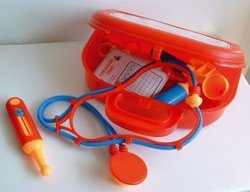IMPORTANT: This article is out of date. Some of the information may be useful so we retain it as an archive, but please do be careful relying on it in full.
Private Medical Insurance (PMI) ain't cheap and, thanks to pricey new drugs and complex medical procedures, its rising cost massively outstrips inflation. Indeed, annual hikes of up to 15% aren't unusual � even if you haven't claimed.
This step-by-step plan is to help you decide whether you need PMI and if you do, what type and what the cheapest way to do it is, possibly saving �100s a year.

Step 1: Do you really need PMI?
Private medical insurance is a luxury, not a necessity. There are three main reasons to buy it: to leapfrog the queue for non-urgent treatment; to choose when and who operates; and to get more comfort and convenience during treatment.
Don't assume private always means better.
The NHS provides comprehensive medical treatment to anyone in the UK who needs it, regardless of their ability to pay � although you may have to wait. Getting fast NHS treatment may be something of a postcode lottery. Yet a good GP is worth his/her weight in gold.
What's more, the �squeakiest hinge gets the grease�, so by being persistent, you may be bumped up waiting lists, especially if you're prepared to grab a cancelled appointment at the drop of a hat.
Remember even if you go private, the doctors and specialists aren't �private� doctors � the vast majority are NHS medics boosting their income. And it's often the NHS specialists who are at the cutting edge of modern medicine.
Furthermore, some private hospitals only provide a basic post-operative care, and medical cover is surprisingly limited at night. So take a turn for the worse and they'll often shove you into an ambulance bound for your local NHS general hospital. Yet if you want and can afford added comfort and much speedier operations then private cover provides this.
Consider a healthcare cash plan.
Healthcare cash plans are very different to PMI and include dental, optical and alternative health too. Here you pay a few pounds a month and if you then need to pay for NHS or private treatment, you can claim some of the cash back up to an annual maximum limit. For full details read the Healthcare Cash Plans article. Think of it as a good added extra to NHS care, rather than an alternative to PMI.
Check whether your employer or your partner's offers a scheme.
Some employers may pay for your PMI for you or your whole family, although this is classed as a �benefit in kind�, so you'll pay tax on the cost. Yet, even if you need to pay yourself, it can be cheaper, because firms' bulk-buying power enables them to negotiate substantial discounts.
So find out the cost and then compare it to the cheapest plans using the following steps. One final note, if your employer doesn't have a scheme see if your partner's company will allow you to join it.
Self Insuring
If you're fitter than a fiddle and healthier than humanity, you probably don't need private medical insurance anyway. Nevertheless, for extra peace of mind, why not self-insure by becoming your own insurer?
Instead of paying, say, �300 a year to a PMI provider, pay �25 a month into a High Interest Savings Account and should you need any minor treatment or consultations, simply dip into your own insurance fund. Stay fit and healthy and you get to keep your �premiums� and accrued interest on top.
If you do decide to �pay as you go� by self-insuring, if you want additional peace of mind, hedge against any serious problems by buying a PMI policy with a high excess (the amount of each claim you agree to pay). Naturally, the higher the excess, the lower the PMI cost.
For example, rather than buying an expensive cover-all policy with an excess of �50, you could agree to pay, eg., the first �5,000 of any treatment. This makes your policy very, very cheap, just a few pounds a month but if you have serious problems, you have some cover to fall back on, limiting your exposure to major problems. To find the cheapest high excess policy follow the steps below.
STEP 2: Cut the cost regardless of the broker
Before I start it's important you know what's covered and what's not, so I've written a separate guide just for this.
There are ways to minimise the cost no matter which insurer you go with. Co-insurance, which means that you pay a proportion of your treatment costs, up to an agreed threshold, lowers the price.
Likewise, limiting yourself to lower-grade hospital accommodation or agreeing to only go private if NHS waiting lists are too long make premiums cheaper. Finally, be healthier! Insurance is much costlier for smokers and the obese.
STEP 3: Do your shopping around automatically
With several hundred different policies on offer, all with different benefits and exclusions, searching the entire market would mean calling hundreds of different companies. There are several price-comparison websites comparing private medical insurance yet, as I warned about, with PMI, you're not comparing apples with apples, so a low-cost policy may provide limited or budget cover, or have many exclusions. Ensure you read its conditions before signing up.
Important warning! If you have any 'pre-existing' conditions they will likely be excluded. Exactly what counts varies, but it can be stringent eg, if you've seen the doctors with headaches, and later on get diagnosed with a brain condition, that could be excluded. For this reason, you should be extremely careful switching if you are already insured elsewhere, as you could decrease your protection.
- MoneySupermarket. Comparison site MoneySupermarket* compares over 550 policies to find the cheapest policy to suit you. What's more, although its comparison is reasonably comprehensive, as it includes companies based on its commercial relationships it doesn't cover all PMI providers, notably Bupa*, Axa PPP and Standard Life.
- PMI Partners. An alternative comparison site is PMI Partners* which includes cover from Standard Life, Norwich Union, Bupa, Pru Health and AXA. While it's simple to use, unlike Moneysupermarket you need to give your name and address in order to receive a quote.
Sometimes, these companies' top picks can be beaten, but at the very least, they give you a useful benchmark to compare other policies against and are very quick to use.
It's worth noting that often insurance policies have upper limits on their payouts, meaning some expensive treatements are effectively excluded from the cover.
STEP 4: Use a specialist insurance broker
As an alternative to the web, if you want advice and guidance to choose a PMI policy, find a member of trade body the Association of Medical Insurance Intermediaries (AMII). They provide independent, specialist advice on individual and group private medical insurance policies.
However, as with all financial advisers, this assistance comes at a price, because AMII members receive commission payments for introducing customers to insurers. Hence, it will pay to haggle armed with the prices you've picked up from the comparison sites: ask brokers to share the commission with you by reducing your premium, or offer to pay a fixed fee in return for buying a nil-commission policy. This could, potentially, save you hundreds of pounds a year on a four-figure annual premium.
STEP 5: Go back to step 1
Finally, the biggest crime with insurance policies is to blindly accept renewal costs without seeing if it can be beaten. Private medical insurance is an annually renewable policy, so costs rise sharply � and sometimes benefits get more restrictive.
Don't just sit back and take ever-increasing premiums on the chin: be prepared to haggle with your existing insurer, or shop around for lower premiums or improved cover. Just be careful to check whether any pre-existing conditions or previous claims will be excluded under your new policy, or switching policy could backfire on you!

Going straight to a standard provider, medical insurance for a single, non-smoking man aged 35, living in South London looking for top-level cover, costs �1010. Following the MoneySaving method above the cheapest found was �480, a saving of �530.
Medical Insurance cost for a 35-year-old non smoking man
| Total | Saving | |
Standard provider | �1010 | - |
MoneySaving plan | �480 | �530 |
 PizzaExpress 3 courses �13
PizzaExpress 3 courses �13 O'Neill's free whiskey
O'Neill's free whiskey Zizzi 20% off food
Zizzi 20% off food








